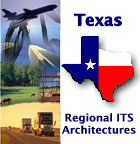

|

|

|

|

|

|

|

|

|

|
TxDOT Del Rio Field Equipment Equipment Packages |
 |
The following equipment packages are associated with the "TxDOT Del Rio Field Equipment" element. Select the "Details" icon to see the detailed process specifications that support each equipment package, or consult the National ITS Architecture web site for more information.
This Equipment package shall provide the capability to receive vehicle signal priority requests and control roadside signals accordingly.
This Equipment package provides the capabilities to monitor traffic flow in major intersections and on main highways for urban areas and to monitor road conditions using fixed equipment such as loop detectors and wireline communication.
Roadway Environmental Monitoring
![]()
This Equipment package measures environmental conditions and communicates the collected information back to a center where it can be monitored and analyzed. A broad array of general weather and road surface information may be collected. Weather conditions that may be measured include temperature, wind, humidity, precipitation, and visibility. Surface and sub-surface sensors can measure road surface temperature, moisture, icing, salinity, and other measures.
Roadway Equipment Coordination
![]()
This equipment package coordinates field equipment that is distributed along the roadway by supporting communications directly between the field equipment. This includes coordination between remote sensors and field devices (e.g., Dynamic Message Signs) and coordination between the field devices themselves (e.g., coordination between traffic controllers that are controlling adjacent intersections.).
Roadway Infrastructure Monitoring
![]()
This equipment package monitors the condition of pavement, bridges, tunnels, associated hardware, and other transportation-related infrastructure (e.g., culverts). It includes sensors that monitor the infrastructure and the communications necessary to report this data to a center or vehicle-based maintenance system.
This Equipment package monitors traffic and road conditions by collecting information from passing vehicles that are equipped with a transponder or other short range communications device. The probe data collected by this equipment package may include link travel times, average speeds, road conditions, and any other data that can be measured and communicated by passing vehicles. This equipment package consists of roadside equipment that communicates with passing vehicles using dedicated short range communications, collects the information provided by the vehicles, and forwards this information back to the Traffic Management Subsystem.
This Equipment package provides the capabilities to control traffic signals at major intersections and on main highways for urban areas. This Equipment package is generally constrained to a single jurisdiction.
Roadway Traffic Information Dissemination
![]()
This Equipment package provides the roadside elements of traffic information dissemination including DMS, HAR, and talking pedestrian signs.
This equipment package detects vehicle intrusions in work zones and warns crew workers and drivers of imminent encroachment. Crew movements are also monitored so that the crew can be warned of movement beyond the designated safe zone.
Roadway Work Zone Traffic Control
![]()
This equipment package directs activity in work zones, controlling traffic through portable dynamic message signs (DMS) and informing other groups of activity (e.g., ISP, TM, other maintenance and construction centers) for better coordination management. Work zone speeds and delays are provided to the motorist prior to the work zones
This Equipment Package manages highway traffic at highway-rail intersections (HRIs) where operational requirements do not dictate advanced features (e.g., where rail operational speeds are less than 80 miles per hour). Either passive (e.g., the crossbuck sign) or active warning systems (e.g., flashing lights and gates) are supported depending on the specific requirements for each intersection. These traditional HRI warning systems may also be augmented with other standard traffic management devices. The warning systems are activated on notification by interfaced wayside equipment of an approaching train. The equipment at the HRI may also be interconnected with adjacent signalized intersections so that local control can be adapted to highway-rail intersection activities. Health monitoring of the HRI equipment and interfaces is performed; detected abnormalities are reported through interfaces to the wayside interface equipment and the traffic management subsystem.
 Web Spinner Technology.
Web Spinner Technology.